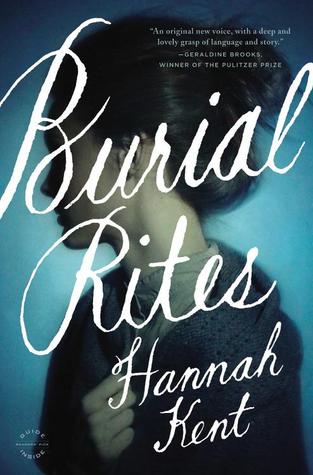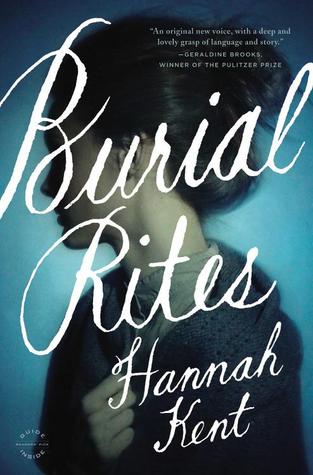Welcome to the March Edition of the #SnS Book Club.
This month we are discussing Burial Rites by Hannah Kent, a young Australian author from South Australia. Burial Rites is her debut novel. And what an incredible debut it is.
Hannah Kent did a rotary exchange in Iceland as a student and it was then that she became aware of the plight of Agnes Magnusdottir, the last person executed in Iceland. Her book is a speculative biography of Agnes’ life and is based on known facts and various historical documents and local records.
I have to say straight up that I loved this book and devoured it in 24 hours on a family holiday last August. I could not put it down. When I finished it, I felt bereft and was incredibly sad. I could not pick up another book for days and in fact, picked Burial Rites up and re-read parts of it again.
In preparation for this post, I began reading it again last week. I was struck again by the beauty of the writing, the poignancy of the prose and the deeply believable account of the life of Agnes and the key characters in her life before and after the deaths at Illugastadir.
1. The Characters
Which characters did you empathise with the most? Like or loathe? Who did you feel indifferent towards?
The key characters for me were Agnes, Margret, Natan and Toti.
Agnes
Dear, dear Agnes. By the end of the book I felt she was my friend. An obviously clever but lonely woman, Agnes’ character was a finely drawn and heartbreaking one. The abandonment by her mother, the separation from her brother, the death of her foster-mother Inga and her baby were heart wrenching to read.
I will never forget the scene where Inga died and Agnes is left holding the newborn, and afterwards, when Agnes is forced to help clean up after the birth/deaths and then to see the corpses in the storeroom for months until the bodies could be buried in the Spring when the ground had thawed.
Until she met Natan, Agnes really had not bared her soul to another. She really was alone and lonely.
I thought Hannah Kent did a brilliant job of slowly revealing Agnes’ sad life and the ambiguity around Agnes’ character. For example, how her strength, intelligence and resilience were seen as evidence of her guilt subsequently.
Magret
What did you make of Magret, the matriarch of the farm at Kornsa? I loved the way she transformed from being bitter and suspicious of Agnes to eventually becoming loving and respectful towards her. She was an almost mother figure in the end.
My heart was in my throat reading that scene at the end of the book where Magret lovingly dresses Agnes before her execution.
Natan
Another key character for me was Natan. He permeated the book in a menacing yet curious way. It was clear from the outset (when the women were gossiping about him when Toti visits the local Reverend) that views in the community differed – was he a gifted healer or a sorceror? It also turned out he was a heathen, a womaniser and an adulterer. Later, Karitas (now Blondal’s maid) tells Toti that Natan used to “toy with people”. He was clearly a manipulator and a nasty piece of work.
I was bewildered and dismayed like Agnes when she arrived at Illugastadir to find herself demoted from housekeeper to maid under Sigga. It was a cruel, disrespectful gesture that I think gave great insight into Natan’s character.
The other scene that speaks volumes about Natan is when he locks Agnes outside one cold, snowy night, naked and she seeks shelter in the cowshed:
“I crouched down next to the cow and pressed my bare skin against her warm bulk, and pulled down a saddlecloth to cover myself with. I pushed my freezing toes into a cowpat so they would not suffer.”
Despite this, Agnes articulated her love for Natan with great eloquence:
“No one could understand what it was like to know Natan. In those early visits it was as though we were building something sacred. We’d place words carefully together, piling them upon one another, leaving no spaces. We each created towers, two beacons, the like of which are built along roads to guide the way when the weather comes down. We saw one another through the fog, the suffocating repetition of life.”
and
“I cannot think of what it was not to love him. To look at him and realise I had found what I had not known I was hungering for. A hunger so deep, so capable of driving me into the night, that it terrified me.”
and
“The weight of his fingers on mine, like a bird landing on a branch. It was the drop of a match. I did not see that we were surrounded by tinder until I felt it burst into flames.”
Toti
Another significant character for me was the young Reverend, Toti. From their meeting in Agnes’ dream, to their chance meeting many years earlier when Toti helped Agnes cross a stream, to their last and final meeting as adults, it is clear that Toti’s kindness has meant a great deal to Agnes in a life marred by the casual and deliberate disregard of others:
“I thought he could help me as he helped me across the river. But talking to him only reminds me of how everything in my life has worked against me and how unloved I have been.”
Interestingly though, Toti is the one transformed by their meetings together. He gradually falls in love with her (I thought) and is forced to reassess the religious pat answers and scripted platitudes he has been taught to give the condemned and the suffering. I found Toti’s gradual spiritual evolution and final support and friendship to Agnes in the lead up to her execution really touching. I loved the scene where he visits Blondal to tell of his “progress” with Agnes too.
Which characters did you love, loathe or find fascinating? I haven’t written of the sisters Lauga and Steina here. Did they stand out for you? What about the neighbour Roslin whose baby Agnes safely delivers? Or Sigga or Frederik?
The Plot
What did you think about the plot?
For me, Burial Rites was a wonderfully woven and layered book. It provided great details but also provided an air of mystery about what is eventually revealed.
The use of Toti’s character provides Agnes with an opportunity to tell her story and for the book to be written in the first (Agnes) and third persons (a narrative).
The way Agnes tells the story of her life to Toti, in the fields, barn and in the badstofa at Kornsa (with the rest of the family and farm hands listening in), in snippets here and there is so effective and keeps those pages turning.
I also loved the way Agnes’ story was interspersed with Toti’s reflections and travels, the brutal realities of rural life in Iceland circa 1800s and Agnes’ private thoughts. I found the details of Icelandic life at that time both intriguing and horrifying. Being snowed in, the life of paupers/urchins and the realities of food production and preservation were all so carefully detailed. I read this and felt ever so grateful to be born and living in Australia in the 21st century! What did you make of it?
The ending of the book is clear from the beginning although, like me I am sure many of you hoped something or someone would intervene to save Agnes from her fate. The last pages leading to her execution, including the final ride to the execution site and the physical manifestations of her anxiety and stress were just harrowing.
However, for me, the climax of the book was the details of the final days at Illugastadir and what led to the death of Natan and Petur’s death and Agnes’ role in the whole saga. It was a sorry tale indeed and I felt for Agnes who obviously thought she had told the truth but this led to her being condemned by others. This seems to have also been exacerbated by Sigga’s involvement – Sigga’s youth, beauty and simple mind (in comparison to Agnes’ intellect and age) ultimately led to her being spared from execution despite her complicity and manipulation.
Favourite Scenes/Lines
I’ve mentioned a few of my favourite lines but there were so many. Here are some more favourites:
“I remain quiet. I am determined to close myself to the world, to tighten my heart and hold onto what has not yet been taken from me.”
“They will see the whore, the madwoman, the murderess, the female dripping blood into the grass and laughing with her mouth choked with dirt. They will say “Agnes” and see the spider, the witch caught in the webbing of her own fateful weaving. They might see the lamb circled by ravens, bleating for a lost mother. But they will not see me. I will not be there.”
“Sometimes, after talking to the Reverand, my mouth aches. My tongue feels so tired; it stumps in my mouth like a dead bird, all damp feathers, in between the stones of my teeth.”
“To know what a person has done, and to know who a person is, are very different things.”
What was your favourite line?
In a Nutshell
I just loved everything about this book – the characters, the writing, all of it. I sincerely hope it will be made into a movie that does it justice.
If you’d like to see or hear more about the book, check out this episode of Australian Story which aired last year and featured Hannah Kent and details the origins of the book. It’s compelling viewing.
What did you think of the book? Did you enjoy it? Would you recommend it to someone else?
I’ve asked a few questions during this post too and I’d love to hear your thoughts about any/all of them.


